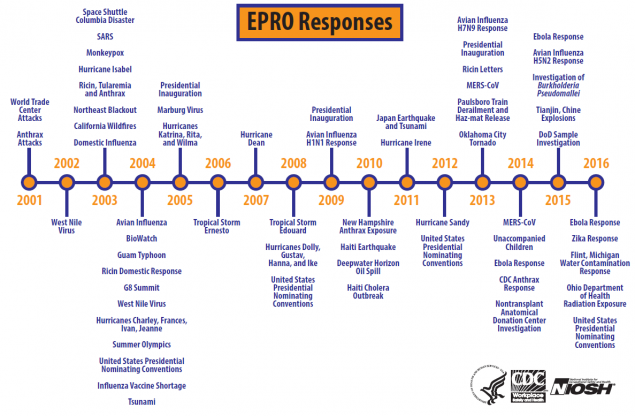Emergency Preparedness and Response Office
Program Impact
NIOSH is strongly committed to program evaluation as a way to maximize its contributions to improved occupational safety and health. Regular review of program activities, outputs, and outcomes is essential to demonstrating program performance. The Emergency Preparedness and Response Office (EPRO) conducts reviews and shares program impact in a variety of ways.
Program Performance One-pager
Program Performance One-Pagers (PPOPs) are a snapshot of NIOSH programs’ priorities, strategies used to make progress towards priorities, recent accomplishments, and upcoming work.
Emergency Preparedness and Response Office Program Performance One-pager
Accomplishments
The NIOSH Emergency Preparedness and Response Office (EPRO) has responded to numerous responses, participated in exercises, and improved response planning and preparedness over the past decade.

Below are some recent impact or accomplishments from our office.
- Published a NIOSH topic page with recommendations for emergency responders on how to prevent occupational exposures to fentanyl.
- Jointly published interim guidance for protecting workers from occupational exposures to Zika virus with OSHA and coordinated 39 deployments to support the Zika response.
- Published 9 interim guidance documents, 8 factsheets, 2 training modules, and 10 communication products that contained recommendations and information to protect workers during the 2014-2015 Ebola epidemic.
- Coordinated 207 NIOSH staff supporting the Ebola response, including staff deployed domestically to 21 states and internationally to 5 countries.
- Provided training to 18 African nations to build capacity for integrating occupational safety and health into emergency responses at a World Health Organization workshop.
- Established a Disaster Science Responder Research Program and developed a strategic roadmap for the program.
- Trained 11 health departments across the nation, including more than 400 individuals, on ERHMS between 2013-2017.
- Conducted six ERHMSTM training classes at the CDC School of Preparedness and Response and trained 120 professional staff between 2015-2017.
- Developed the ERHMS Info ManagerTM free software tool, user manual, and five training videos available at: to assist responders in implementing the ERHMSTM framework within their organizations.
- Developed a voluntary roster of 55,000 Deepwater Horizon workers to obtain a record of those who have participated in the response and a mechanism to contact them about possible work-related symptoms.
- Developed gold-standard Bacillus anthracis (anthrax) field sampling methods and associated online training for field sampling teams.
- Page last reviewed: September 14, 2017
- Page last updated: September 14, 2017
- Content source:
- National Institute for Occupational Safety and Health Office of the Director


 ShareCompartir
ShareCompartir